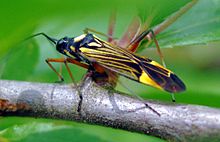
Pentatomidae is a family of insects belonging to the order Hemiptera, generally called shield bugs or stink bugs. Pentatomidae is the largest family in the superfamily Pentatomoidea, and contains around 900 genera and over 4700 species. As hemipterans, the pentatomids have piercing sucking mouthparts, and most are phytophagous, including several species which are severe pests on agricultural crops. However, some species, particularly in the subfamily Asopinae, are predatory and may be considered beneficial.

Littorina is a genus of small sea snails, marine gastropod molluscs in the family Littorinidae, the winkles or periwinkles.
In zoological nomenclature, author citation refers to listing the person who first makes a scientific name of a taxon available. This is done in scientific work while fulfilling the formal requirements under the International Code of Zoological Nomenclature. According to Article 51.1 of the Code, "The name of the author does not form part of the name of a taxon and its citation is optional, although customary and often advisable." However, recommendation 51A suggests, "The original author and date of a name should be cited at least once in each work dealing with the taxon denoted by that name. This is especially important and has a unique character between homonyms and in identifying species-group names which are not in their native combinations". For the sake of information retrieval, the author citation and year appended to the scientific name, e.g. genus-species-author-year, genus-author-year, family-author-year, etc., is often considered a "de-facto" unique identifier, although this usage may often be imperfect.

Chrysolina is a large genus of leaf beetles in the subfamily Chrysomelinae. Most species are distributed in Europe, Asia and Africa with a small number of species inhabiting North America and introduced species in Australia.

Conus striatus, common name the striated cone, is a species of sea snail, a marine gastropod mollusk in the family Conidae, the cone snails and their allies.

Empis is a genus of dance fly, in the fly family Empididae. It contains the following subgenera and species:

Laphria is a genus described by Johann Wilhelm Meigen in 1803, belonging to the family Asilidae, subfamily Laphriinae. Members of this genus are known as bee-like robber flies. This genus has a Holarctic distribution, occurring in Europe, Asia, and North America. They prey on a variety of insects, including other robber flies, bees, wasps and beetles. Like other asilids, they use their proboscis to penetrate the body of their prey and inject enzymes which dissolve the tissues.

Carabinae is a subfamily of ground beetles in the family Carabidae. There are about 10 genera and more than 1,400 described species in Carabinae.
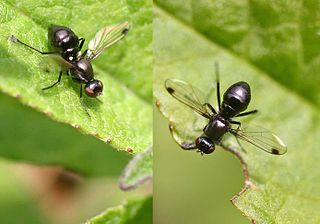
Sepsis is a genus of flies in the family Sepsidae.
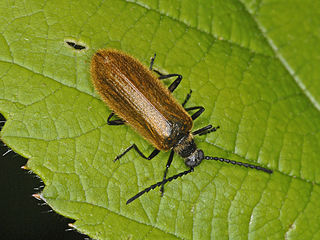
Lagria is a genus of beetles in the family Tenebrionidae.
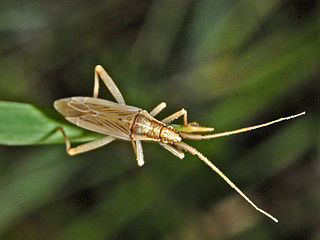
Stenodema is a genus of Palaearctic, Oriental and Nearctic plant bugs in the family Miridae and the tribe Stenodemini.

Sphaeridium is a genus of beetles in the family Hydrophilidae, the water scavenger beetles. They occur in Europe, and some species have been introduced to North America.

Terellia ceratocera is a species of tephritid or fruit flies in the family Tephritidae.
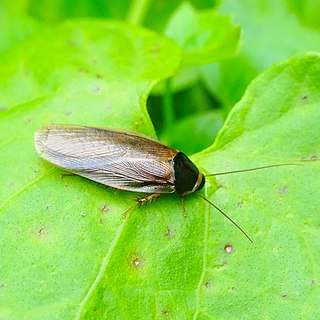
Pycnoscelus is a genus of cockroaches in the family Blaberidae. There are about 15 described species in the genus Pycnoscelus.
Allygus mixtus is a species of true bug belonging to the family Cicadellidae.
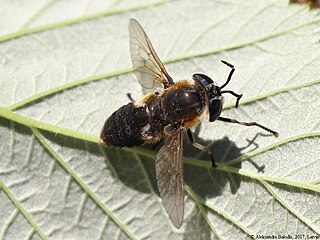
Heptatoma is a genus of European flies belonging to the subfamily Tabaninae.

Dryocoetes is a genus of beetles belonging to the family Curculionidae, in the subfamily Scolytinae.
